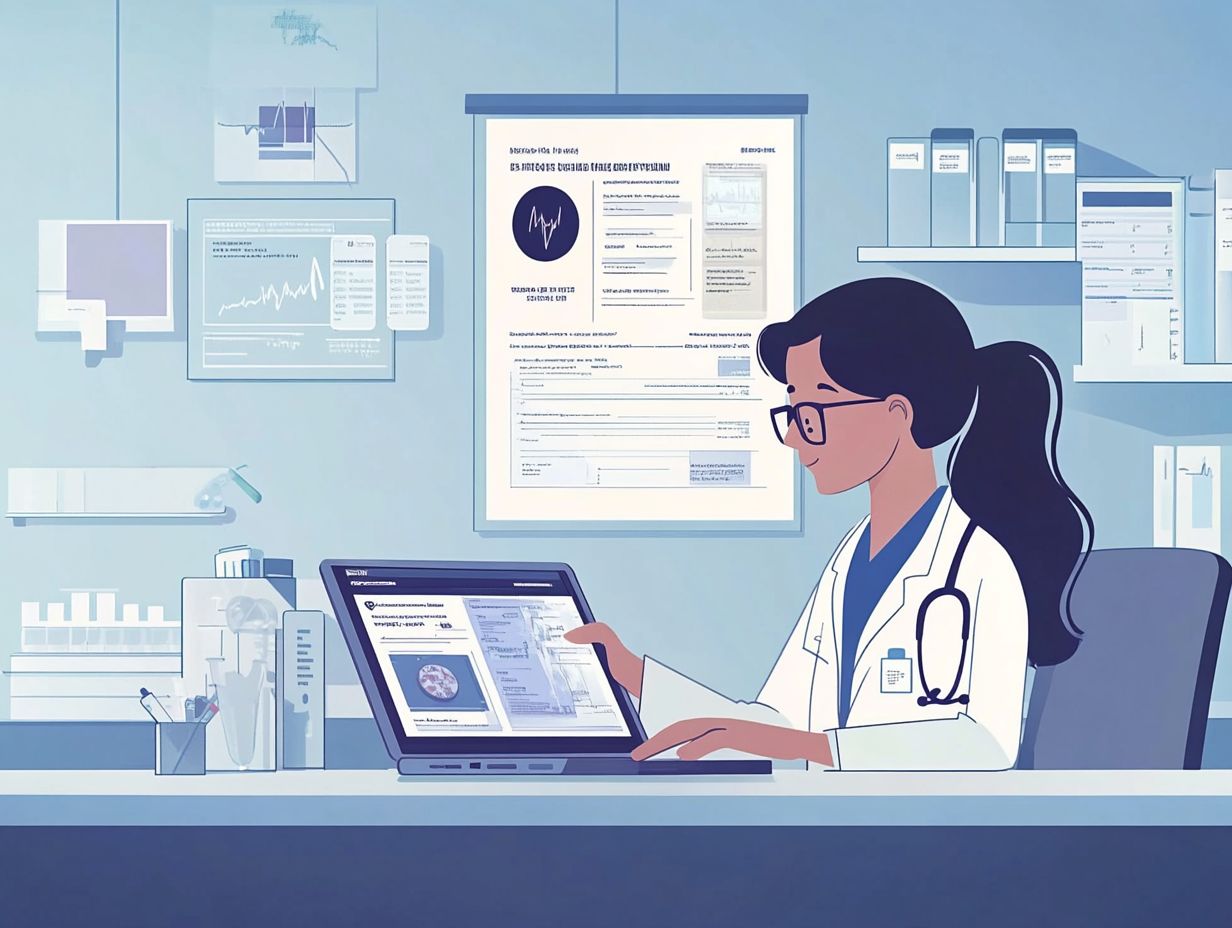What is a Certified Health Data Analyst?
In today’s data-driven healthcare landscape, the role of a Certified Health Data Analyst is becoming increasingly vital. This position involves various important tasks and skills needed to succeed in health data analysis.
This article covers the certification process, educational requirements, and the promising career outlook for those who choose this path. Get ready to uncover valuable insights that can shape your future!
Contents
Key Takeaways:

A certified health data analyst is a professional who analyzes and interprets healthcare data to improve patient care and organizational efficiency. Key duties include data collection, analysis, and reporting, along with strong skills in data management, statistical analysis, and healthcare knowledge. To become a certified health data analyst, one must meet educational and professional requirements and pass a certification exam, which can lead to a promising career with job opportunities and competitive salary potential.
Overview of Health Data Analysis
Health data analysis is essential in revolutionizing healthcare, leveraging data analytics to reveal insights that can substantially enhance healthcare outcomes.
By synthesizing extensive healthcare data collected from patients, health insurance companies, and providers, analysts empower evidence-based practices, streamline healthcare processes, and facilitate knowledge-based decision-making within institutions.
As healthcare technology advances and the demand for highly skilled professionals rises, the significance of this critical field becomes increasingly pronounced.
What is Health Data Analysis?

Health data analysis involves the meticulous collection, processing, and interpretation of healthcare data to extract meaningful insights that can shape healthcare policies and practices.
This analytical undertaking is pivotal in both clinical and public health environments, empowering you to make informed decisions rooted in empirical evidence.
By diving into trends related to patient outcomes, treatment effectiveness, and population health metrics, you can pinpoint successful interventions and allocate resources with precision.
Analysts use various data types, such as electronic health records, patient registries, and survey responses.
To aid in this process, tools like statistical software and data visualization platforms come into play, enabling you to present intricate data in a clear and comprehensible manner.
For example, predictive analytics tools that help forecast future health issues can help you anticipate disease outbreaks, while real-time monitoring enhances your ability to manage chronic conditions more effectively.
Roles and Responsibilities of a Certified Health Data Analyst
A certified health data analyst holds a pivotal position in the healthcare landscape, employing their expertise in data management and analysis to bolster healthcare providers and elevate the quality of care delivered.
You ll find them interpreting intricate health data and generating insights that inform data-driven decisions while collaborating seamlessly with clinical data analysts to enhance healthcare outcomes.
By harnessing healthcare technology and data analytics, these professionals empower healthcare institutions to effectively leverage health data for strategic planning and operational efficiency.
Key Duties and Skills

As a health care analyst, your key responsibilities involve collecting and analyzing health care data, preparing insightful reports, and making data-driven decisions that significantly impact health care practices.
This role requires a robust skill set, particularly proficiency in data analytics software, allowing you to handle and display large amounts of data easily.
A solid understanding of health care rules is essential; it ensures compliance and equips you to navigate the complexities of the industry effectively.
Being familiar with the latest health care technologies is also vital, as they give you the power to leverage innovative solutions that enhance patient outcomes.
Altogether, these skills elevate your effectiveness, ultimately contributing to improved health care delivery and knowledge-based decision-making within your organization.
Certification Requirements
To become a certified health data analyst, you must meet certain educational and professional criteria that validate your expertise in health care data analysis.
This usually involves obtaining a degree in health information management or a related field, along with relevant certifications that showcase your proficiency in navigating health care data and analytics tools.
You may also need to gain experience working in health care settings, allowing you to grasp the complexities of health care processes and data management effectively.
Educational and Professional Requirements

The educational path for a health care data analyst often begins with a bachelor’s degree in health information management, data analytics, or a closely related field.
Pursuing certifications like the Certified Health Data Analyst (CHDA) or the Certified Analytics Professional (CAP) can significantly bolster your qualifications.
Practical training in tools such as SQL, Python, or Tableau is highly beneficial, as these skills are essential for navigating and analyzing extensive datasets.
As the health care sector continues to evolve rapidly, ongoing education becomes essential. Staying updated with the latest technologies and methodologies is crucial for effective data management and analysis.
Engaging in workshops, webinars, and industry conferences not only helps you maintain a competitive edge but also equips you to harness emerging trends in health care technology.
Career Outlook for Certified Health Data Analysts
The future looks bright for certified health data analysts! The demand for skilled professionals in health care is rising, fueled by the increasing reliance on data analytics to improve health care outcomes.
As health care providers and institutions prioritize data-driven decision-making, job opportunities in this field are expected to grow significantly.
Additionally, the salary potential for certified health data analysts is becoming increasingly appealing, underscoring the vital role they play in the dynamic landscape of health care technology.
Job Opportunities and Salary Potential
The demand for health data analysts is soaring, with a variety of exciting roles available across many sectors, including hospitals, health insurance companies, and government organizations.
As a health data analyst, you play a vital role in supporting decision-making processes by providing valuable insights into patient outcomes, resource utilization, and operational efficiency.
In this field, positions such as data scientist, business intelligence analyst, and clinical data manager are increasingly sought after.
It’s not just traditional health care that s on the lookout; pharmaceuticals and public health agencies are actively recruiting for these roles as well.
Salaries for health data analysts can vary widely, typically ranging from $60,000 to over $110,000 annually, depending on factors such as experience, location, and the specific demands of the employer.
Recent trends highlight a growing emphasis on telehealth and electronic health records, influencing both the availability and compensation of these positions. Organizations are increasingly prioritizing data-driven strategies to enhance health care delivery.
Steps to Become a Certified Health Data Analyst
Becoming a certified health data analyst requires you to navigate a series of steps that lead from educational foundations to professional certification and a rewarding career in healthcare.
- First, pursue relevant educational qualifications, such as a degree in healthcare data analytics or health information management.
- Next, gaining practical experience through internships or entry-level positions is crucial for developing the skills you need to excel in this role.
- Finally, getting certified as a health data analyst boosts your credentials and significantly improves your job prospects in the competitive healthcare job market.
Process and Preparation Tips
The journey to becoming a certified health data analyst demands thoughtful planning and meticulous preparation to thrive in this competitive arena.
Start by pinpointing key study materials, such as recommended textbooks, online courses, and practice exams that meet industry standards. Obtaining relevant certifications can significantly bolster your credibility, making it imperative to focus on exam strategies and develop an efficient study schedule.
Network with professionals in the healthcare community to gain invaluable insights and potential job leads. Engage in forums, attend industry conferences, and join organizations dedicated to health data analysis to cultivate relationships that support your career advancement.
Continuous professional development is key. By staying updated on emerging healthcare technology trends, you ensure that you remain competitive and effective in your role.
Watch Our Overview
Frequently Asked Questions
What is a Certified Health Data Analyst?
A Certified Health Data Analyst, or CHDA, is a healthcare professional who specializes in analyzing, interpreting, and managing health data. These individuals are highly skilled in using data analysis software and tools to make informed decisions and improve healthcare outcomes.
How can one become a Certified Health Data Analyst?
To become a Certified Health Data Analyst, meet the eligibility requirements set by the American Health Information Management Association (AHIMA). This includes having a minimum of a bachelor’s degree and relevant work experience in healthcare data analysis. After meeting the eligibility criteria, pass the CHDA certification exam to earn the credential.
What are the benefits of being a Certified Health Data Analyst?
Being a Certified Health Data Analyst unlocks many career opportunities in the healthcare industry. It also demonstrates a high level of expertise and credibility in the field of health data analysis, making individuals more competitive in the job market. Additionally, CHDA credential holders are required to participate in continuing education, ensuring they stay up-to-date on the latest industry advancements.
What skills are required to be a successful Certified Health Data Analyst?
To be a successful Certified Health Data Analyst, have a strong foundation in data analysis and statistical methods. Possess excellent critical thinking and problem-solving skills, along with the ability to communicate complex data findings clearly and concisely. Familiarity with various data analysis tools and software is also essential.
What are the typical job duties of a Certified Health Data Analyst?
A Certified Health Data Analyst’s job duties may vary depending on their specific role and work setting. Common responsibilities include collecting and analyzing health data, identifying patterns and trends, creating reports and visualizations, and making recommendations to improve healthcare outcomes. They may also work with other healthcare professionals to develop data-driven strategies for patient care and population health management.
Is there a demand for Certified Health Data Analysts?
Yes, there is a high demand for Certified Health Data Analysts in the healthcare industry. With the increasing use of electronic health records and the need for data-driven decision making, the demand for skilled professionals in health data analysis is expected to continue to grow. CHDA certification is a powerful tool for advancing your career.






